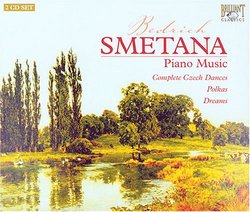| All Artists: Smetana, Kubalek, Schmalfuss Title: Smetana: Piano Music (Complete Czech Dances, Polkas, Dreams) Members Wishing: 0 Total Copies: 0 Label: Brilliant Classics Release Date: 5/31/2005 Genres: Dance & Electronic, Classical Styles: Ballets & Dances, Polkas, Chamber Music, Forms & Genres, Short Forms, Historical Periods, Classical (c.1770-1830), Instruments, Keyboard Number of Discs: 2 SwapaCD Credits: 2 UPC: 842977024517 |
Search - Smetana, Kubalek, Schmalfuss :: Smetana: Piano Music (Complete Czech Dances, Polkas, Dreams)
 | Smetana, Kubalek, Schmalfuss Smetana: Piano Music (Complete Czech Dances, Polkas, Dreams) Genres: Dance & Electronic, Classical
|
Larger Image |
CD DetailsSimilar CDs |
CD ReviewsBrilliant Smetana R. Pohl | Brno, Czech Republic | 06/18/2005 (5 out of 5 stars) "I have 6 complete recordings of Czech Dances (2 versions with Kubalek and others with Firkusny, Novotny, Jirikovsky, Leichner) and know many others records of selected parts. And I have also my own experience, because I perform this pieces (not only dances, but Dreams and Etudes, too). So I must say, that Kubalek's performance is the best, there is no doubt for me. Schmalfuss is only minor pianist, but Kubalek is world class and he really understand this music. The dances are much poetic and expressive in his hands... But in Czech republic, there are still two diferrent streams on Smetana's playing. In fact, I think, that the both are right. Smetana was virtuoso and great dancer. He admired Liszt and Liszt appreciated him. But he was also musical poet and dreamer. He eas nationalist, indeed... but he was great musician, and this si the feeling, which Kubalek has drawn and shown to the audience. He is even giving masterclasses about this music. I am Czech pianist, so I think, I speak as an expert. This is high recommendation. Listen to Kubalek's readings of Czech music and then you will understand it." SECRET GARDEN DAVID BRYSON | Glossop Derbyshire England | 05/31/2005 (4 out of 5 stars) "It needs a bit of goodwill to award this set a fourth star, but the goodwill is there so far as I'm concerned because it has opened for me a chapter of 19th century piano music that had been closed, indeed its very existence unsuspected. Smetana's output was not large, but a surprisingly high proportion of it was for piano. He was himself a pianist, unlike Dvorak, and he must have been an accomplished one to judge from the difficulty of some of the 30 pieces here. The two discs consist of recitals by two different artists, recorded 8 years apart in time. Such problems as the set gives me are largely concerned with the recording, and oddly the earlier disc (1980 at some undisclosed location) strikes me as being a considerably better piece of engineering than the later. Antonin Kubalek's recital comprises the full 14 Czech Dances - 4 polkas, 1 furiant and the balance bearing picturesque titles of various kinds. Peter Schmalfuss gives 5 more polkas plus 11 'Reves', not of a predominantly dreamy kind and with a strong dance-element in many of them. Taking the performances for themselves, so far as I can do that without discussing the recorded quality, Schmalfuss comes across much more successfully. For me Kubalek doesn't in general succeed in making the music really dance. I would have liked a bit more definition and firmness in his rhythm generally. His technical command is well up to the task and he turns in some good professional virtuosity in the Bear Dance and the Stamping Dance, but I feel a certain lack of personality about him. He is not helped by the recording he has been given, which is too favourable towards the bass, very much so in the 4 polkas. He may also be overdoing the pedal rather, but I sense that this is likely to be the fault of the recording again - the bass is actually pretty clear, so a certain over-resonance is probably down to the recording technicians. Matters improve greatly with the second disc. Again, the recording leaves something to be desired, but it is certainly a lot better, wherever it was done. The sound of Schmalfuss's piano is really quite satisfactory with sufficient body and good balance between treble and bass: the only problem is a bit of metallic 'bloom' on the top notes, which is something I can discount without much problem. There is a great deal more zest and heartiness to this recital by and large. Some of the pieces, such as the 'Macbeth and the Witches' number or the Concert Study, are of near-Lisztian difficulty and showiness (as well as being a lot more musical in my own opinion). Schmalfuss goes about these with aplomb, but what appeals to me most of all is the true sense of dancing in the music. The real thrill for me has been in discovering the music, and I shall be returning to this set often - both discs, whatever my griping about Kubalek. Dvorak is no doubt a 'greater' composer than Smetana, but there is a self-consciousness about his worn-on-the-sleeve Czechery that gets me down a bit. I love the freshness and spontaneity of Smetana, the nationalist elements displayed naturally and with pride but without descending to mannerisms. There are two interesting short liner notes, one of them by Kubalek himself. For me, this music has been a major and really delightful discovery, and such criticisms as I must in honesty offer matter to me very little in comparison with that." Brilliant's Super-Budget Reissues of Essential Smetana Piano J Scott Morrison | Middlebury VT, USA | 09/18/2006 (5 out of 5 stars) "I've owned both of these CDs in their original versions -- the Kubalek on the now (alas) defunct Dorian label -- and am happy to have them both together on the superbudget Brilliant label. Brilliant seems to be doing what Naxos did early on, certainly with their amazing prices. They tend to buy up rights to well-regarded but now out-of-the-catalog recordings and reissue them at rock-bottom prices and I say hallelujah for that!
The music contained herein is not well-known to non-Czechs, even by pianists. More's the pity because there is some lovely stuff here. Smetana was himself a virtuoso pianist and he wrote ever so much better for the instrument than his younger Czech colleague, Dvorák. I own several versions of the Czech Dances and the blind pianist Antonin Kubalek's is, for me, the best one largely because of its subtlety, particularly with those tricky Czech rhythms. It is not necessarily the version that grabs you immediately by the ear by way of its virtuosity, but Kubalek knows how the pieces should go better than even his countryman Firkusny, whose version is a runner-up in this literature. Although recorded in the fabled Troy Savings Bank Music Hall, the recorded sound is just a bit boxy, but not enough to interfere with Kubalek's patrician style. Peter Schmalfuss, a student of Gieseking and Kempff, recorded the other Smetana bits and pieces in 1980. These works are not otherwise easily available. The pieces are generally more virtuosic but less immediately interesting for me. But I really like 'Am Segerstade' ('On the Strand'), a flurry of watery arpeggios decorating a lovely melodic line and 'Sehnsucht' ('Longing') is notable for its aching melody. Some of Smetana's more Lisztian efforts -- some of the 'Rêves', for instance -- leave me unmoved but I can easily imagine someone else lapping them up. Schmalfuss is a very good pianist and is given better sound than Kubalek, but he doesn't quite have the feel for Czech gestures that Kubalek does. Nonetheless, I strongly recommend this two-CD set at least partly because Brilliant has done a marvelous thing to reissue these two excellent discs at such a wonderful price, even if, I notice, you will need to buy it from one of Amazon's 'marketplace sellers'. [Just a word about that: I have had excellent luck using vendors via this Amazon website.] Scott Morrison" |

 Track Listings (14) - Disc #1
Track Listings (14) - Disc #1

